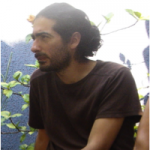Link to Pubmed [PMID] – 18267953
Link to DOI – 10.1093/cercor/bhm261
Cereb Cortex 2008 Oct; 18(10): 2352-7
During evolution, the mammalian cerebral cortex has expanded disproportionately to brain volume. As a consequence, most mammals with large brains have profusely convoluted cortices. The human cortex is a good example of this trend, however, given the large variability in human brain size, it is not clear how cortical folding varies from the smallest to the largest brains. We analyzed cortical folding in a large cohort of human subjects exhibiting a 1.7-fold variation in brain volume. We show that the same disproportionate increase of cortical surface relative to brain volume observed across species can be also observed across human brains: the largest brains can have up to 20% more surface than a scaled-up small brain. We introduce next a novel local measure of cortical folding, and we show that the correlation between cortical folding and size varies along a rostro-caudal gradient, being especially significant in the prefrontal cortex. The expansion of the cerebral cortex, and in particular that of its prefrontal region, is a major evolutionary landmark in the emergence of human cognition. Our results suggest that this may be, at least in part, a natural outcome of increasing brain size.

